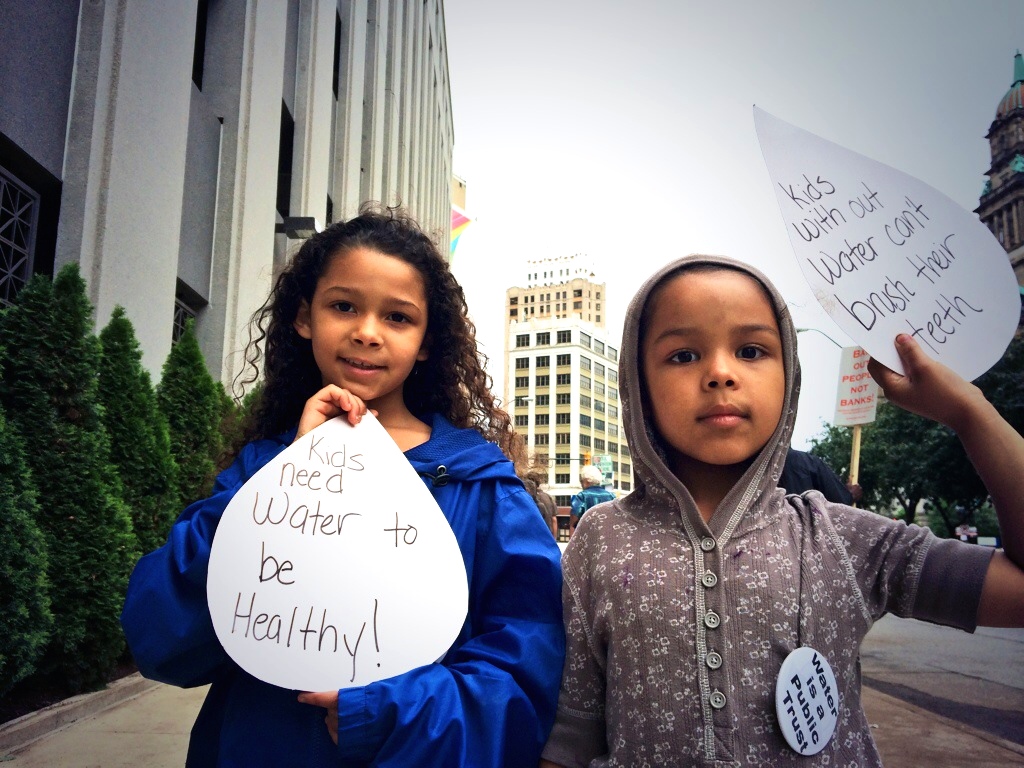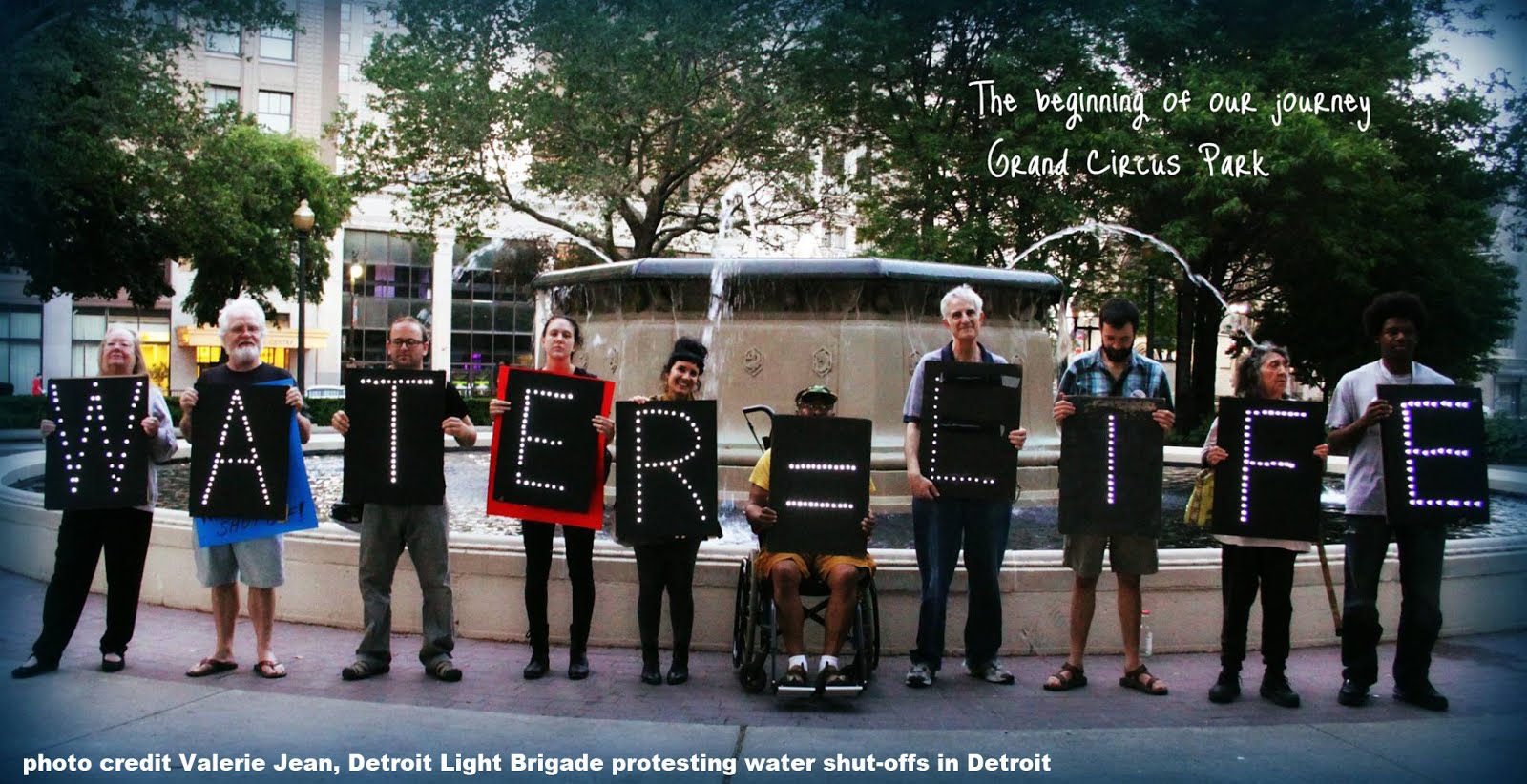Right now in Detroit, Mich. – which sits next to the Great Lakes containing the largest body of freshwater on Earth, and 84% of North America's freshwater supply – nearly half of all Detroiters or approximately 300,000 people are having their access to running water shut off or threatened. Read Council of Canadians Chairperson Maude Barlowe’s statement here on the water crisis gripping the city.
The current scheme, spearheaded by Detroit's unelected Emergency Manager Kevyn Orr and supported by the Detroit Water and Sewerage Department, is causing more chaos under the guise of city bankruptcy, strengthening stereotypes and racial divisiveness, and moving working-class people out of their homes – all for the ultimate goal of privatizing Detroit’s water.
You can read more information and details here, or refer to Carl Gibson's article, Apartheid In Detroit, published on Occupy.com last week.
So what is being done?
A coalition of Detroiters have come together with the People’s Water Board to provide resources, information and action planning that can turn the tide against privatization and austerity policies.
The People’s Water Board advocates for access, protection and conservation of water, upholding the following tenets:
Water is a human right and all people should have access to clean and affordable water.
Water is a commons that should be held in the public trust free of privatization.
Now, people are coming together across Detroit, across the nation, and across the world to stand up and recognize that it's time to address this injustice head on – while creating systems in its place that take care of our communities and planet.
The Detroit Water Brigade, a member of the People's Water Board, is hosting a weekend of Water Awareness this Saturday and Sunday, June 28 and 29, from 12pm to 5pm at Jacobi Ra Park (Woodward @ Avalon in HP) as part of Detroit Water Week. Organizations like Michigan Welfare Rights and Sierra Club will be providing information and assistance for emergency relief and also water conservation strategies.
There will also be water cooler giveaways and opportunities for people to sign up and volunteer to fight the shutoffs. From 2:30pm to 5:00pm on Saturday there will be the first installation of a community water station at the Dexter/Elmhurst Community Center led by We the People of Detroit.
How Can You Contribute?
-
Spread the word about the city's water crisis!
-
Tweet using the hashtags #HumanRight, #PeoplesWaterBoard, #DetroitWaterWeek, #WaterCrisis, #Detroit and #PeoplesWaterBoard
-
Volunteer: If you're in the Detroit area, please join the Water Week.
-
Donate: There is a fund set up to match local donations for people in dire need of maintaining access to water. Detroitwaterbrigade.org is accepting water coolers, rain catchment and purification equipment as well as cash.
-
Sign this petition demanding that Detroit turn the taps back on.
-
Love your water! We, like our planet, are made mostly of water, so give thanks!
Meanwhile, on Wednesday the United Nations reported that three UN experts on water and sanitation, adequate housing, and poverty expressed concern about the widespread water disconnections in Detroit among households unable to pay water bills:
“Disconnection of water services because of failure to pay due to lack of means constitutes a violation of the human right to water and other international human rights,” the experts said.
“Disconnections due to non-payment are only permissible if it can be shown that the resident is able to pay but is not paying. In other words, when there is genuine inability to pay, human rights simply forbids disconnections,” said Catarina de Albuquerque, the expert on the human right to water and sanitation.
The experts have been informed that a large-scale water shut-off for non-payment is happening in the City of Detroit, Michigan. The Detroit Water and Sewerage Department has been disconnecting water services from households which have not paid bills for two months, and has accelerated the process since early June, with the number of disconnections rising to around 3,000 customers per week. As a result, some 30,000 households are expected to be disconnected from water services over the next few months.
Because of a high poverty rate and a high unemployment rate, relatively expensive water bills in Detroit are unaffordable for a significant portion of the population.
Leilani Farha, the expert on the right to adequate housing, expressed concern that children are being removed by social services from their families and homes because, without access to water, their housing is no longer considered adequate. “If these water disconnections disproportionately affect African Americans they may be discriminatory, in violation of treaties the US has ratified,” Farha added.
“When I conducted an official country mission to the U.S. in 2011, I encouraged the U.S. government to adopt a federal minimum standard on affordability for water and sanitation and a standard to provide protection against disconnections for vulnerable groups and people living in poverty. I also urged the government to ensure due process guarantees in relation to water disconnection,” said de Albuquerque, renewing her call to the federal government to take action.
According to international human rights law, it is the State’s obligation to provide urgent measures, including financial assistance, to ensure access to essential water and sanitation. “The households which suffered unjustified disconnections must be immediately reconnected,” the experts said.
3 WAYS TO SHOW YOUR SUPPORT
- Log in to post comments















